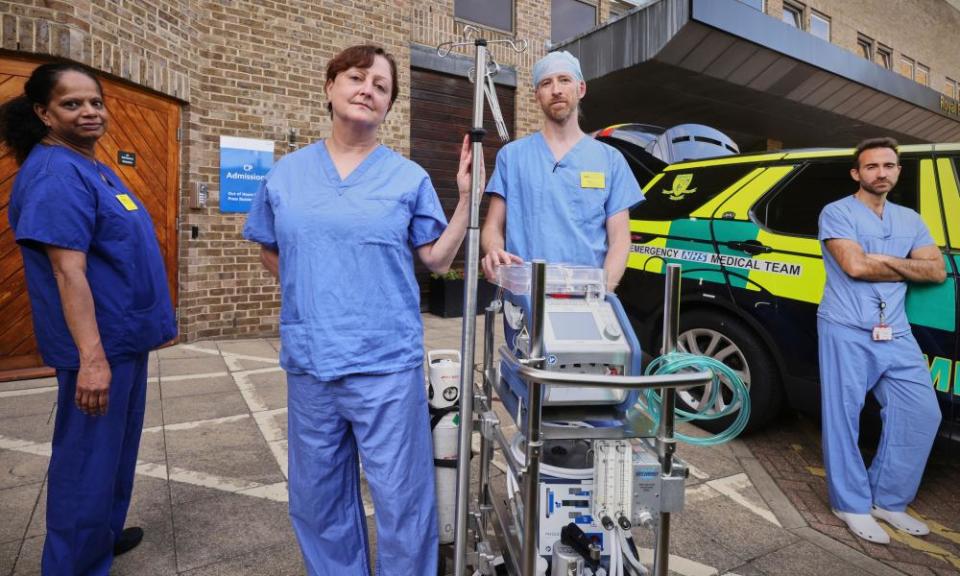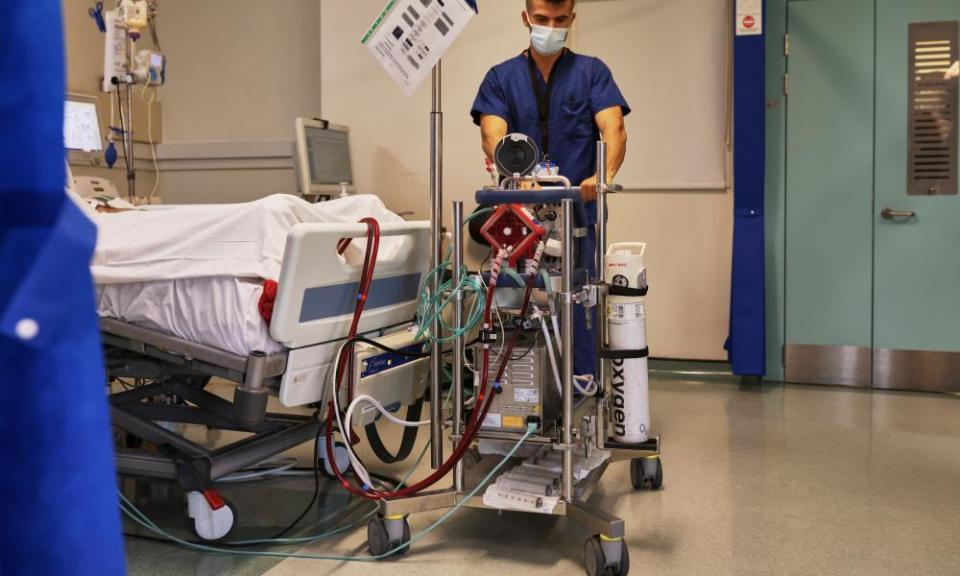London hospitals use ‘James Bond medicine’ to tackle rare heart condition

World-leading NHS doctors are using “James Bond medicine” and cutting-edge technology to save the lives of people whose hearts collapse due to a rare and often fatal cardiac condition.
Royal Brompton and Harefield hospitals in London have begun sending teams of specialist medical personnel to hospitals in England and Wales to pick up patients who would otherwise die.
People suffering from cardiogenic shock (CGS) are brought to Royal Brompton or Harefield hospital, which form one of Britain’s centres of excellence in heart medicine, in a last-ditch attempt to save them.
Patients receive intensive treatment only available at a few hospitals, including extracorporeal membrane oxygenation (ECMO), in which blood is extracted from their body, has extra oxygen added and is then put back to try to help them breathe again on their own.
Under the hospitals’ “shock programme” their doctors, surgeons and intensive care experts also discuss and give advice on how to treat people with CGS, a condition that hospitals all over the UK have asked for urgent help with. The work is increasing survival rates among the 10,000 people a year who end up in CGS, which until recently had a death rate of about 50%.
The condition is a life-threatening one in which the patient’s heart suddenly cannot pump enough blood around the body, and untreated can quickly lead to multi-organ failure and death.
Most cases occur as a side-effect of a severe heart attack, which mostly affects older people. But it can also be caused – especially in younger adults – by a clot on the lungs, a faulty heart valve, abnormal heart rhythm, giving birth, or an infection damaging the heart muscles.
“It’s the extreme manifestation of heart failure and the byproduct of another medical emergency. It’s like having a cardiac arrest, but in very slow motion,” said Prof Susanna Price, a consultant in cardiology and intensive care at the Brompton, who is the programme lead.
Prof Martin Cowie, a consultant cardiologist and the programme’s lead for heart failure, said: “Although this might seem the James Bond 007 end of medicine – reaching into other hospitals to ‘rescue’ them for more intensive and lifesaving treatment – it is actually about the NHS making sure the patients who might benefit will, wherever they are.
“We don’t care why your heart has failed. We just want to rescue you.”
The hospitals set up the service – the first of its kind in the UK – after a 17-year-old girl with CGS in a remote part of Wales died in 2018 when the hospital treating her misdiagnosed her as having sepsis. “It was immensely distressing because she had a potentially reversible condition. Myself and my colleagues realised that there was no national programme to treat CGS, thought ‘that’s not good enough’ and decided to set up our shock programme,” said Price.

As soon as another hospital alerts them to a case the hospitals convene an emergency virtual multidisciplinary team meeting – even overnight – of a range of their top specialists. They then either guide the doctors on how best to manage the patient or send a blue-light ambulance to collect them. Treatment in the London hospitals gives them a higher chance of living, though not everyone survives.
The Brompton and Harefield hospitals treat 700 patients a year who have suffered a major breakdown of their cardiac system, of whom 60 to 70 have ended up in CGS.
The ECMO machine – an 18in-tall metallic contraption – is vital to survival. About 20 to 30 patients a year go on that and are in a coma; it is the highest form of life support in the NHS, above that of a mechanical ventilator. The others are put on a ventricular assist device. The tubes in and out of the machine are red with the blood being extracted and returned.
“ECMO isn’t a treatment as such. The ECMO machine buys us time. It supports the body while we fix the underlying cause, such as by doing surgery to repair a heart valve,” Price said. But, she added: “ECMO can be a very, very high-risk invasive thing to undertake, especially with older patients who have had a heart attack.”
The shock programme’s success means doctors in hospitals around Europe now occasionally ring for advice. The team has even retrieved one British national in CGS from Spain.
Nine or 10 times a year they also undertake a caesarean section in a pregnant woman who is in CGS. So far all the mothers involved have survived.
The shock programme has boosted survival rates among patients treated at the Brompton and Harefield hospitals for CGS from 51% in 2018 to 86% in 2020-21.
Reflecting on this dramatically reduced mortality, Price said: “It’s very rewarding to be able to give people their lives back. You have the patient there and we as a team are able to bring to bear extraordinary expertise and negotiate a path to survival without which they would have died.”
• This article was amended on 26 October 2021 to remove references to the Royal Brompton and Harefield hospitals being a standalone trust. This is no longer the case as they have become part of another trust.

 Yahoo Finance
Yahoo Finance 